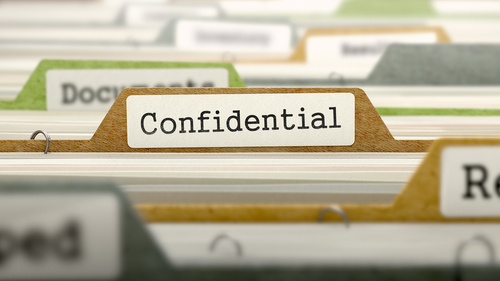Government lawyers' use of 'confidential information' in private practice clarified in new ABA ethics opinion

Lawyers who work in government or serve as public officials have special confidentiality obligations, and they should not use “confidential government information” when representing private clients, according to an ABA ethics opinion released Wednesday. (Image from Shutterstock)
Lawyers who work in government or serve as public officials have special confidentiality obligations, and they should not use “confidential government information” when representing private clients, according to an ABA ethics opinion released Wednesday.
Formal Opinion 509 applies to lawyers who used to work in government too, as well as attorneys with government jobs that do not require bar passage. It clarifies the scope of Model Rule 1.11(c) of the ABA Model Rules of Professional Conduct.
Under this rule, a lawyer in government generally cannot represent a “private client” with adverse interests to a person or entity about whom the lawyer acquired “confidential information” while doing government work.
The purpose of the rule is to prevent government or former government lawyers from using their position to benefit a private client and protect others from the exploitation of confidential government information that the lawyer acquired while serving as a public officer or an employee.
Most discussion involving Rule 1.11(c) focuses on lawyers who used to work for the government and have confidential information that they acquired from their former positions. But the ethics opinion stresses that the rule equally applies to current government lawyers who also have such information.
Additionally, it applies to attorneys whose government jobs don’t involve practicing law, such as police officers who moonlight as lawyers. It also applies, as a New York State Bar Association opinion opines, to a town supervisor who maintains a part-time law practice. The officer or town supervisor, who both practice law, could acquire confidential information that could be used to benefit a current private client and harm a third party. Such action is not allowed.
Also, the opinion explains that the term “private client” refers to any individual or entity that the government or former government lawyer represents in private practice, who is not entitled to the confidential information.
“The rule is plainly intended, in part, to prevent a lawyer from using confidential government information on behalf of a private (i.e., nongovernmental) individual or entity whom the lawyer represents in full-time or part-time private practice and who is not entitled to exploit the information,” according to the opinion.
General Motors Corp. v. City of New York in 1974, in which a lawyer sought to represent the city of New York against the General Motors Corp., is cited in the opinion. The problem was that a lawyer used to work for the U.S. Department of Justice and had confidential information from the DOJ’s antitrust lawsuit against the General Motors Corp. Thus, the lawyer was disqualified.
“The rule does not apply, however, when a current government lawyer represents a party, including a private individual, in the lawyer’s role as a government lawyer,” according to the opinion.
It also doesn’t apply to a government lawyer who transfers from one government job to another. However, for certain jobs, such as if a prosecutor transferring to a public defender’s office, that would present a problem under other ABA rules.
An ABA press release is here.
Write a letter to the editor, share a story tip or update, or report an error.



